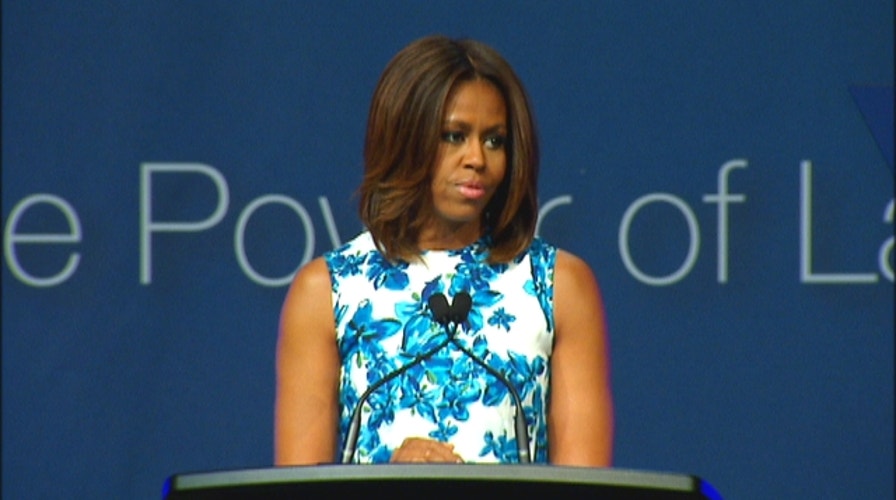Michelle Obama on education, immigration
Michelle Obama speaking at the annual convention of the League of United Latin American Citizens, or LULAC, in New York City.
New York – First Lady Michelle Obama said on Thursday that Latinos have made great strides in education, but that they also have to surmount the fact that they lag behind in college rates.
Speaking at the annual convention of the League of United Latin American Citizens, or LULAC, in New York City, Obama said: “When it comes to college, Latinos are far more likely to drop out.”
“In the face of so many challenges and obstacles, you’re still asking the hard questions,” she told the audience, which filled a spacious ballroom at the Hilton hotel in midtown Manhattan. “How do we instill in them that hunger for education?”
“There are still too many young people in this country who aren’t getting the education they need,” she said. “Too many young people in the Latino community just aren’t fulfilling their potential.”
Michelle Obama was introduced by actress and singer Jennifer Lopez, who said she and the first lady shared many interests, including working to improve education among minorities.
The first lady launched an education initiative, called Reach Higher, several months ago aimed at getting more low-income youth to aim for college.
Michelle Obama has sought to establish a connection between herself and the young people her initiative seeks to influence by using her own experience as an example of overcoming the odds and reaching for the seemingly unattainable, even when others try to discourage you.
The first lady said that she received an Ivy League college education despite lacking privileges.
She noted that her parents did not go to college. She grew up in a working class home on the South Side of Chicago. Her father, Fraser Robinson, was a pump operator for the Chicago Water Department, and her mother, Marian, was a homemaker.
But her parents, she said, gave her priceless support and motivation to reach high.
“We have to reignite that hunger for education,” Obama said. “Parents have to be reading to their kids from an early age and make sure they go to school every day and do their homework every night. Our young people, you have to make education your number one priority. If you know someone who’s not planning to go on past high school, I want you to reach out to them.”
She has spoken to groups about how she shared her hope of going to an Ivy League college with high school counselors who, in her words in a past speech, told her “that I shouldn’t reach that high, that I didn’t have what it takes to get into a school like Princeton.”
But, drawing inspiration from her brother, Craig, who gained admission to Princeton, where he was recruited to play on the basketball team, Michelle Obama said “I ignored the naysayers.”
But she still has a scar, she has conceded. “I still hear that doubt ringing in my head.”
The first lady, who is 50, studied sociology and African-American studies at Princeton University, then graduated from Harvard Law School in 1988.
She has recalled how, as a child, she endured early and long bus rides to school, but said she was determined to make the best of it, knowing it was a price to pay for the education she wanted to receive.
“The work of pursing your dreams is never finished,” the first lady said. “There will always be doubters and cynics who will tell you to set your standards lower. When you start to doubt yourself, just buckle down.”
As part of her Reach Higher initiative, Obama is meeting with students across the country, as well as with teachers, administrators and counselors.
The initiative, the White House has said, is part of President Obama’s larger goal of having the United States have the highest proportion of college graduates in the world by 2020.
In recent years, Hispanics have made significant gains in college enrollment in both two- and four-year institutions.
From 1996 to 2012, college enrollment among Hispanics ages 18 to 24 more than tripled, outpacing increases among blacks and whites. In fact, for the first time in 2012, Hispanics’ college enrollment rate among 18- to 24 year-old high school graduates surpassed that of whites, by 49 percent to 47 percent, according Pew Research.
But while they’re enrolling at more impressive rates, Latinos are not doing as well at completing their college education.
In 2012, Hispanics accounted for just 9 percent of young adults (ages 25 to 29) with bachelor’s degrees.
Mindful of the focus at the moment among many Latino rights groups on the soaring numbers of unaccompanied minors crossing the U.S.-Mexico border, Michelle Obama noted it, which the administration has called a humanitarian crisis.
'With a broken immigration system hurting so many of our families and neighbors, some of you right now might be wondering why I've decided to focus on education today," she said. "We must try to tackle all these issues at the same time."





